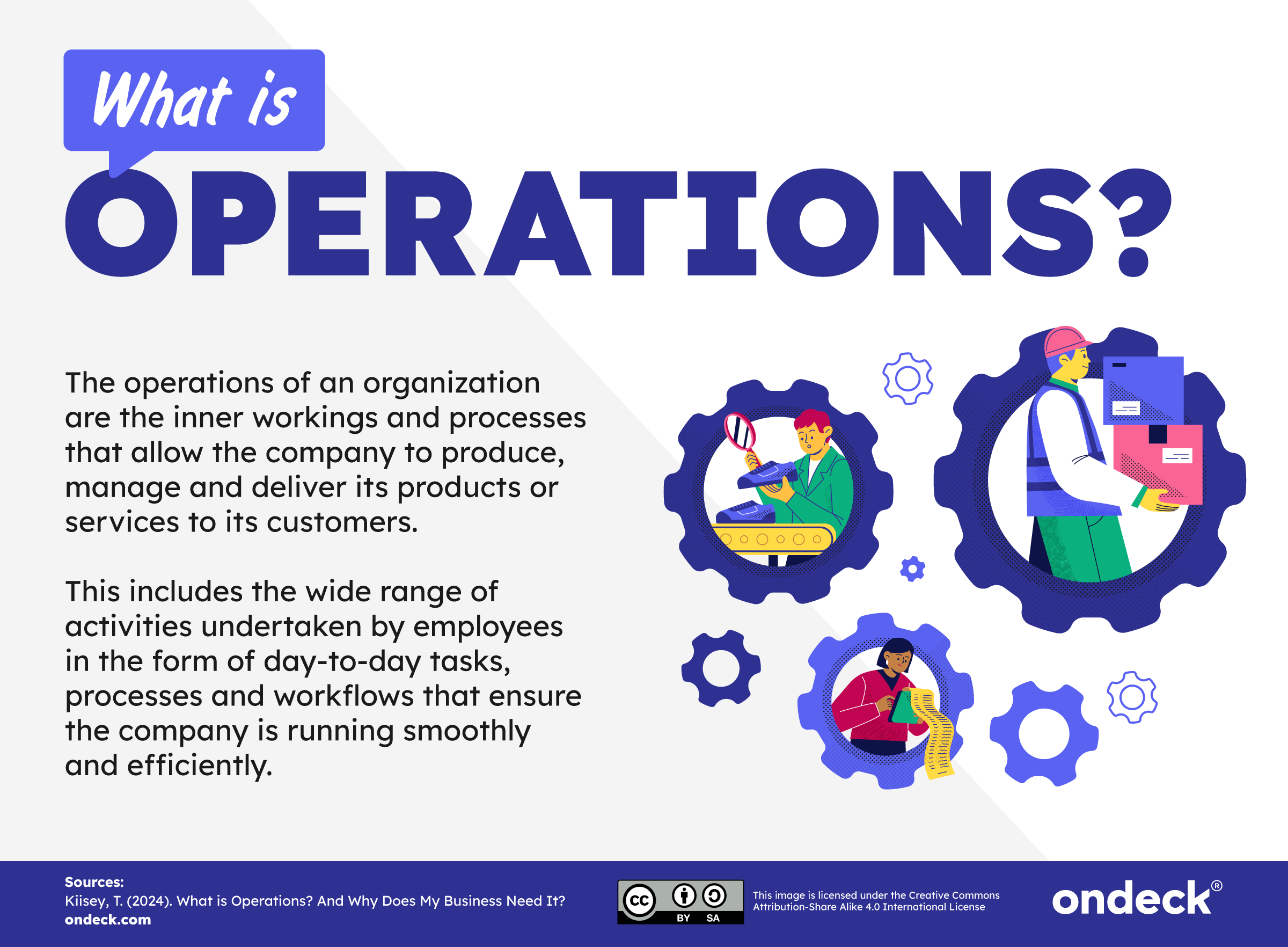What is Operations? And Why Does My Business Need It?
In simple terms, “operations” is the internal engine that powers your business.
If you are currently trying to extend your product line, open a brand in an up-and-coming neighborhood, resolve a purchasing inefficiency or improve customer loyalty, then you should look at your company’s operations.
In this article, we will explain the basics of operations and cover key differences in operations management for small businesses across different industries.
What Is Operations?
When we talk about “operations” in the context of a business, we are referring to the processes and inner workings that allow a company to run as efficiently as possible.

Whether you make products, sell products or provide services, every small business owner has to oversee the design and management of the behind-the-scenes work that makes up their company’s operations.
Well-run operations is a critical and often overlooked source of a business’s success. It can help streamline costs, allowing you to do more with less and maximize the impact of business funding such as a business line of credit or term loan.
At a small business, you may not want to dedicate a single person to an operations role. Rather, both employees and owners should understand how the business works and how various processes impact day-to-day tasks.
Regardless of your industry and type of business, your first approach to business operations will most likely include the design, planning, management and ongoing improvement of processes for the production of goods or provision of services, management of your team and management of the company and its finances.

Business operations should grow and evolve as your small business grows. In larger organizations, business operations teams collaborate with internal teams and are responsible for managing and improving four major elements:
- People: How to bring the right people on board, each with clearly assigned roles and responsibilities that align with their abilities and skills.
- Processes: How to build repeatable workflows that allow your team to complete their tasks independently, without errors, consistently and in the most effective way.
- Technology: How to ensure tools and equipment help your employees complete their daily tasks in the most productive and cost-efficient way.
- Location: How to choose a location that will not only be the most suitable work environment for your team but also optimal for customers and vendors.
When done correctly, implementing business operations in your business will improve efficiency and productivity, leading to higher customer satisfaction while increasing revenue and profitability thanks to more streamlined processes and reduced costs.
How to Optimize Operations for Different Types of Small Businesses
The specific definition of operations will depend on your industry and the stage your business is in. Sometimes, improving operations means thinking strategically about your systems and processes. Other times, it means being part of the on-the-ground work to bring every aspect of a project, from tiny to huge, to reality. Whatever your needs may be, developing an operations manual is usually a good place to start.
Here are some examples of operations in different industries and how mastering your processes can contribute to success.
Operations for a Retail Business
As the owner of a retail business, your daily goal is to stock the items customers want at a price they’re happy to pay. For your operations, that means perfecting your inventory.
Take a look at the records from last season:
- What products are selling well?
- What products are sitting, unwanted, on the shelves?
- Can you negotiate lower prices or better terms from your vendors?
- Would your customers be willing to pay more for any of the items you sell?
While some of the answers will be obvious when you crunch the numbers and analyze the results, another operational update might be to implement a software program that can manage and optimize your inventory in real-time so you can address these questions more quickly and more often.
Operations for a Restaurant Business
Food businesses have even more challenging inventory problems than retailers since their product is perishable. At a restaurant, operations apply not just to foodstuffs but also purchasing, preparation and the costs of food, beverage and labor. You’ll also be concerned with customer service and customer experience at your restaurant.
As you look to streamline your operations, you can think on the following questions:
- Can you work with your chef to create menu items that reduce food waste?
- Can you improve the organization of your walk-in refrigerators to optimize food freshness?
- Can you offer further training to your staff to exceed customer expectations?
- Can you negotiate lower prices or better terms from your suppliers?
There’s a big range here, so think through who should be in charge of leading the different aspects of operations, since it likely won’t fall to one person.
Operations for a Service Company
Service companies can divide their operations into two key buckets: client-facing and business-related. As you analyze the performance of both, you will be able to assess how your current processes for communicating, collaborating and managing projects affect the services you’re offering.
Start by thinking through your client interactions:
- What could happen more quickly?
- Is the customer experiencing any unnecessary notifications?
- Is there any step in the customer journey where you could introduce a self-service functionality?
- Is there any client that is continually coming in over budget?
For example, if client projects are continually coming in over budget, one big operational concern would be the methods used to calculate your estimates at the beginning of a job.
Operations for a Product Manufacturing Business
The origin of the term “operations” comes from companies that made physical goods. Back when economies were industrializing, inventive businesses tried to add efficiencies wherever possible. That led entrepreneurs like Eli Whitney to pioneer the method known as parts-based assembly so that cotton gins and other products could come to market more rapidly, cheaply and consistently.
You don’t have to reinvent the assembly line if your small business makes products, but you should take a good look at how you purchase, store, make and ship your merchandise.
Consider your methods from a time standpoint:
- Is there a way to consolidate big orders so you can save time by working in bulk?
- Are there bottlenecks in your production that might have simple solutions?
- Could your transportation be improved upon?
- Could you negotiate better with your suppliers?
Operations for a Digital Company
Much of a digital company’s value lies in its personnel. For you, operations have a lot to do with finding optimal ways of hiring, training and mentoring your staff. Tools to help with employee retention and satisfaction are wrapped into this, too.
In order to improve your operations, start by thinking about the following questions:
- Does your team have the right tools and software for seamless collaboration?
- What should your full-time employees spend their time on?
- What types of tasks are best left to external experts?
- Are there any bottlenecks that consistently get in the way of delivery?
Wrapping Up
Operations is key to running a business that’s always getting better and better at what it does. By taking a look at the day-to-day activities that make your business possible and asking yourself questions about existing processes, you’ll be able to define and optimize what operations means for you and your organization.
This content is for educational and informational purposes only, and is not intended as financial, investment or legal advice.



